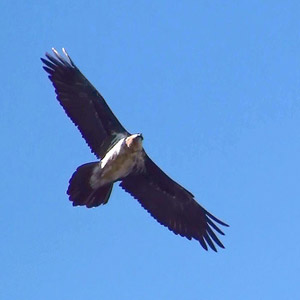Magazine | Études
Bilan des prospections du gypaète le 16/10 et le 4/12/2010 dans les Alpes françaises

Gypaète barbu (Gypaetus barbatus).Phootgraphe : BirdingInSpain / Wikipedia
Introduction
Le Gypaète barbu (Gypaetus barbatus) est un superbe vautour qui a disparu des Alpes au 19ème siècle à cause de la chasse et des empoisonnements. Grâce à un vaste programme de réintroduction qui débuta en 1986 en Autriche, l’espèce se reproduit désormais à nouveau dans l’arc alpin.
Dans le cadre de l’IBM (International Bearded Vulture Monitoring), une journée de suivi des populations de Gypaètes barbus dans l’arc alpin, a eu lieu le samedi 16 octobre 2010 depuis le Mercantour en France jusqu’aux Alpes orientales autrichiennes. L’association ASTERS, responsable du suivi en Haute-Savoie, a organisé cette prospection sur le département. Elle nous a transmis le bilan de cette journée dans toutes les Alpes françaises, ainsi que celui d’une seconde prospection limitée à la Haute-Savoie réalisée le 4 décembre 2010.
Abstract
Bearded Vultures once were found in almost all mountain ranges of southern Europe and in the Alps. The payment of rewards for shooting and capturing, the use of poisoned baits and the shooting for zoological collections led to the extermination of the species in the Alps during the 19th Century. With the aid of the Frankfurt Zoological Society, WWF and IUCN this group founded in 1978 at Morges (CH) the « International Project for the Reintroduction of the Bearded Vulture into the Alps ». Only captive bred young birds were used. The first birds were released in 1986 in Austria. In France, the Bargy (Haute-Savoie) was the first area where some birds were introduced in 1987. In May 2010, 19 couples were counted in the Alps and 11 successfully raised a chick.
The 16th of October 2010, an international survey has been organized in the Alps, from France to Austria, as a part of the IBM (International Bearded Vulture Monitoring): the French association ASTERS gives us the results for Haute-Savoie and for different areas in the French Alps.
ASTERS also sent us the results of an another survey focused on Haute-Savoie organized the 4th of December 2010.
Poursuivez la lecture de cet article, en vous abonnant dès maintenant !
Découvrez les Archives d’Ornithomedia.com
Pour seulement 10,00 €TTC/an (ou 6,00 € les 6 mois)
Profitez de plusieurs centaines d’articles en accès illimité et sans aucun engagement.
Compléments
Ouvrages recommandés
- Le guide Ornitho de Killian Mullarney
- Carte routière : Haute-Savoie, 4074, 1/150000 de Carte Michelin
- Guide des rapaces diurnes du monde de David-A Christie et al
Sources
- Wildtier Schweiz (2010). Gypaète barbu : réintroduction dans les Alpes. http://www.wild.uzh.ch
- IBM (2010). http://www.gyp-monitoring.com




Aucun commentaire sur ce sujet
Participer à la discussion !